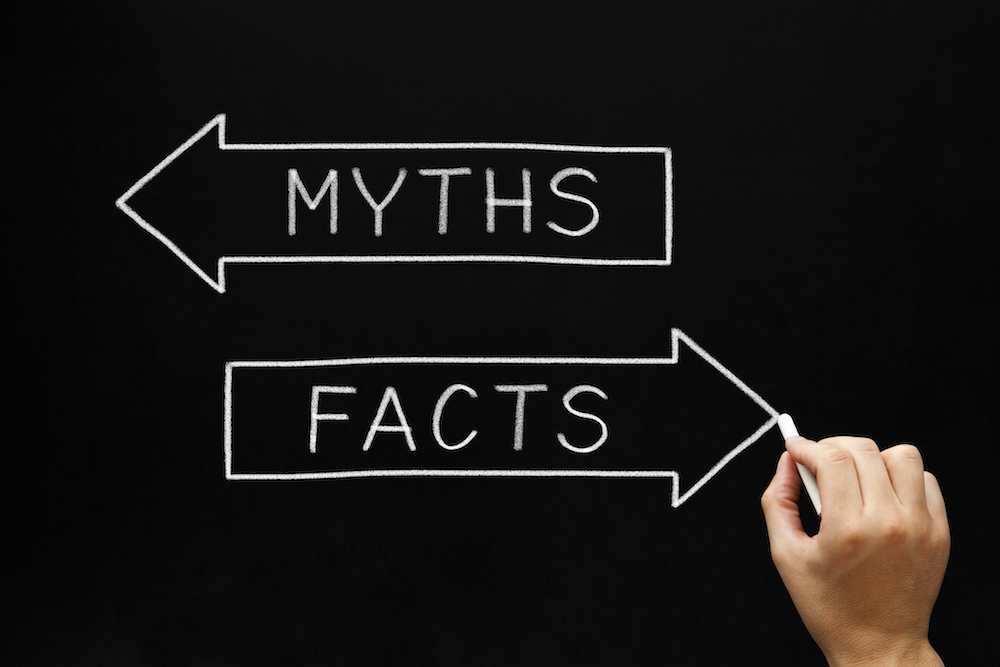Myth Busters Mortgage Edition: 7 Mortgage Myths Debunked
As the old adage goes, you can’t believe everything you hear—the same is true about mortgages. Despite the advice you may have received from friends or family, there is no one-size-fits-all-solution when it comes to getting a mortgage loan.
Everyone’s situation is unique, and as a result each person has a different home buying experience. What may have worked for them may not necessarily be right for you.
Buying a house is too big of a decision to rely on hearsay. That’s why we’re discussing seven common mortgage myths and revealing the truth:
Myth #1: You need a 20% down payment to buy a house.
While conventional wisdom says you should have a 20% down payment to buy a house, this is not required to get a mortgage. The truth is, there are several loan programs that require little to no money down.
There also down payment assistance programs offered through the Michigan State Housing Development Authority (MSHDA) that can help qualifying individuals with the cost of homeownership. As one of the Top MSHDA Lenders in the state, we work hard to make sure families and individuals in Michigan obtain the assistance they need to become homeowners.
If you need help coming up with money to buy a house, you can also use gift money (as long as you can document the source of the funds) and seller concessions to ease the cost of homeownership.
To learn about more ways you can offset the cost of buying a home, check out our “Low-Down On Down Payment Options For Homebuyers” blog post. And, if you need help boosting your down payment fund, here are 15 ways you can start saving for a mortgage today.
Myth #2: The only money you need to close is your down payment.
Another common misconception is that the down payment equals the amount of cash needed to close. While homebuyers are required to bring their down payment to the closing table, they also need to bring enough money to cover closing costs—which can range anywhere between one to seven percent of the purchase price.
At Ross Mortgage, we believe customers deserve to know exactly what they are paying for. That’s why we provide every customer with a cash-to-close worksheet and a Good Faith Estimate that explains the costs associated with closing. We even put together a list of common closing costs that homebuyers can expect to pay on closing day.
Myth 3: Once you’re pre-qualified, you’re guaranteed a loan.
Before you start searching for homes, the first thing you’ll want to do is get pre-approved for a mortgage. There are several benefits of getting pre-approved, including the ability to earn the trust of realtors and sellers, and increase your negotiating power when it comes times to make an offer on a house.
You’ll notice we haven’t used the word pre-qualified. That’s because a pre-approval and a pre-qualification are two different documents that hold different promises. To put it simply, getting pre-qualified for a mortgage does not guarantee that you will be able to get a mortgage.
When a lender pre-qualifies you for a mortgage, they don’t take the time to verify your financial information, and therefore cannot in good faith make a commitment to lend you money when you’re ready to buy. A letter of pre-approval is granted after your financial information has been verified, and is thus the only document that represents a future commitment to lend.
Myth #4: You should always choose the lender with the best interest rate.
Getting a low rate on your loan is good, but there are many other factors that need to be considered before choosing a lender to work with. Ultimately, you want to find a lender that understands your financial plan and has the knowledge and experience to help you find a mortgage loan that fits your needs.
By taking the time to carefully assess your financial situation and goals, they will be able to counsel you on the costs and tax advantages associated with homeownership and help you find a loan that fits within your financial plan.
Myth #5: 30-year fixed-rate mortgages are always the best option.
When it comes to getting a mortgage, one-size-fits-all solutions do not apply. Everyone’s financial situation is different, so it’s best to consult with your loan officer about which loan is best for you. After all, it is one of the biggest purchases you will make in life. You want to make sure you’re making a decision that’s right for you.
There are many factors that go into deciding which type of mortgage loan to get. One factor you’ll want to consider is the length (or term) of your mortgage. Will you get a 30-year loan or a 15-year loan? When combined with a great interest rate, the right loan term can help you maximize your savings over the life of the loan.
You’ll also want to consider whether you’ll get a fixed or adjustable-rate mortgage. Each option has it’s own benefits. The key is to finding the option that works best for you. This is why it’s critical to work with a lender that understands the scope of your financial plan. Depending on your salary, tax bracket, financial goals and how long you want to stay in the house, they can help you choose a loan that benefits you financially and explain how to get the best rate possible.
Myth 6: You can’t get a mortgage if you have had a bankruptcy or foreclosure.
Your credit history does have a significant impact on your ability to qualify for a mortgage. Most mortgage lenders require an average credit score of 620 or higher, and will verify that you have the ability to repay your mortgage loan. However, just because you have encountered financial difficulties in the past does not necessarily mean you can’t buy a home today.
The Department of Housing and Urban Development (HUD) released new FHA lending guidelines that can help former homeowners buy again. If the recession caused you to experience a financial hardship that resulted in a bankruptcy, foreclosure, deed in lieu or modification, you may be eligible for financing today.
Watch this video to learn how the FHA Back to Work program can help homebuyers impacted by the recession buy again!
Myth #7: Once I submit my financial information, my work is done.
Buying a home is one of the most exciting, and one of the most complex, purchases you will ever make. Moving a loan from application to closing requires teamwork from all parties involved, including the homebuyer. While it’s our responsibility to make your home buying experience as smooth and seamless as possible, we need your help to get the loan approved and closed on time.
There may be points along the process where we need additional documentation in order to move forward. The sooner you can provide your loan officer with all the necessary paperwork, the smoother the entire process will be. The key is to find a lender who is attentive to your needs and goes out of their way to make you comfortable and confident throughout the entire process. Together you are a team
Before you put an offer on a house and sign the dotted line, do your homework and consult with lending experts. They will help you navigate the mortgage process and find a solution that’s right for you.
Are you getting ready to buy a house? What are some of the mortgage myths you’ve heard? We’ll tell you whether it’s based on fact or fiction.
- 15 vs. 30-year loan
- 20% down payment rule
- best interest rate
- closing costs
- down payment assistance programs
- FHA Back-to-Work program
- finding a lender
- fixed vs. adjustable-rate mortgage
- home buying process
- mortgage myths
- pre-qualified vs. pre-approved
- Ross Mortgage Corporation
- saving for a down payment
- top MSHDA lenders










